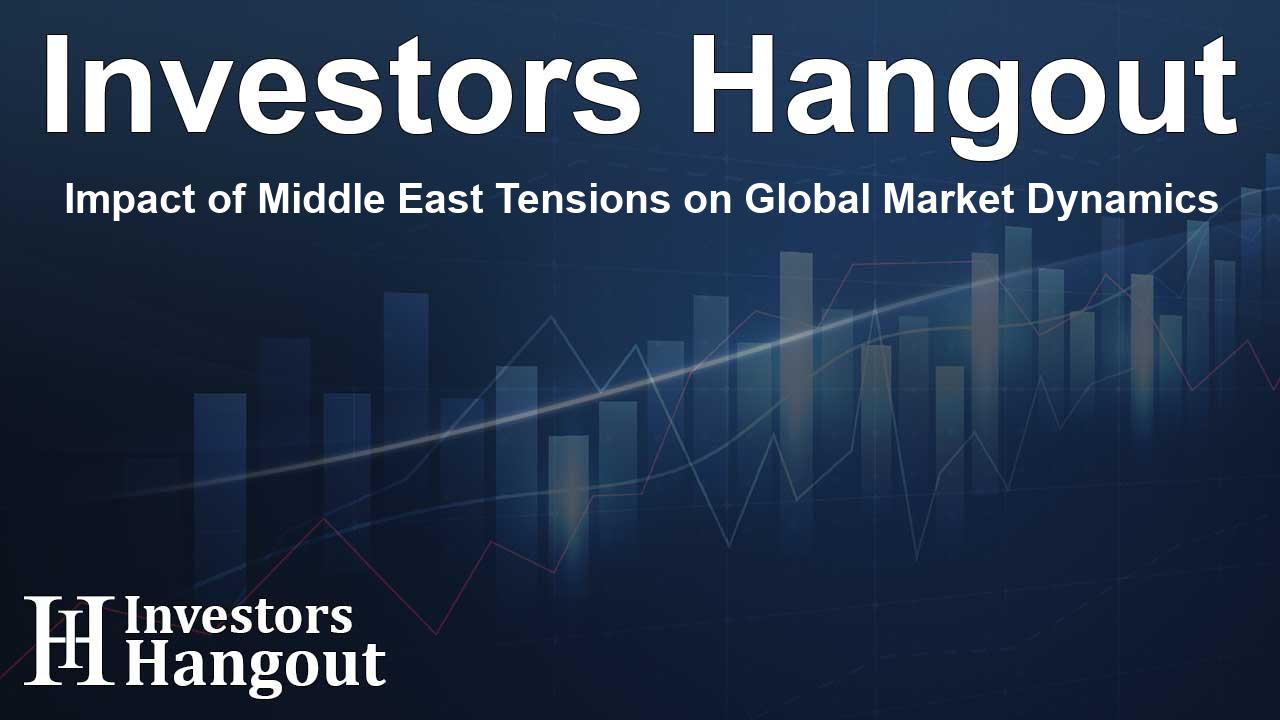Impact of Middle East Tensions on Global Market Dynamics

Impact of Rising Tensions in the Middle East on Financial Markets
As tensions escalate in the Middle East, many investors are becoming increasingly apprehensive about the implications for global markets. The uncertainty cast by geopolitical conflicts can be daunting, particularly for those holding riskier assets.
Recently, the situation intensified when a series of ballistic missile strikes were launched at Israel by Iran, which was claimed to be retaliation against Israeli military actions involving Hezbollah forces. This incident sent shockwaves through the market, leading to an immediate flight to safety among investors.
Market Fluctuations Amidst Geopolitical Risks
Economists observed a notable sell-off on one recent Tuesday, with the S&P 500 Index dropping by 1.4% at its worst point before recovering slightly to close 0.9% down. Similarly, the Nasdaq Composite experienced a decline of as much as 2.3%, ultimately settling at a 1.5% loss for the day. The rush towards safe-haven assets, like gold and U.S. Treasuries, reflects a traditional response to geopolitical instability.
The historical context of such selling patterns becomes crucial. Past events, including Russia's invasion of Ukraine, demonstrate how investors often retreat from risky investments and gravitate towards safer options like gold and government bonds whenever a significant conflict arises. Many are concerned that this trend is beginning to manifest again.
The Uncertain Path Ahead
Analysts assert that the direction of future market developments will largely hinge on Israel's strategic responses to these provocations and whether the conflict will escalate further. Investors remain on edge, grappling with the implications of possible military actions and how they could affect broader economic stability.
According to market experts, there is a high degree of sensitivity in the financial markets to geopolitical developments. Any escalatory measures could trigger drastic market reactions and provoke fears of a more extensive conflict affecting global trade dynamics.
Oil Prices and Economic Concerns
One of the most pressing concerns surrounding geopolitical tensions is the behavior of oil prices. Following the missile strikes, there was a significant surge in oil prices due to fears regarding supply disruptions from the Gulf region. Historical patterns show that periods of intense geopolitical strain often correlate with spikes in oil prices, which can have a cascading effect on global economies.
Industry observers have noted that if conflict continues, oil prices may surge further, particularly if military actions disrupt the oil-producing regions near Iran. Such developments could hinder economic growth and inflate energy costs for consumers worldwide.
Market Volatility Ahead of Upcoming Events
Looking beyond the regional conflicts, there are numerous domestic factors contributing to current market volatility. The upcoming U.S. election is set to unfold in November, which heightens the stakes for market participants. The uncertainty surrounding electoral outcomes can amplify market reactions and drive unpredictable trading behaviors.
One notable indicator of investor anxiety is the Cboe Volatility Index, often referred to as the VIX. This index recently increased, hitting a three-week high before stabilizing slightly lower. Traders perceive this uptick as a precursor to potential significant market fluctuations connected to ongoing geopolitical events and economic indicators.
The Road Ahead for Investors
In summary, the confluence of escalating tensions in the Middle East and pressing domestic themes creates a complex landscape for investors. With many watching closely to see how geopolitical dynamics unfold, market participants are poised for volatility in the immediate term.
As they navigate these uncertain waters, the overall sentiment among investors will likely remain cautious. Moving forward, attention will be focused on how external factors like military responses and domestic economic reports materialize, influencing market trends and investment strategies.
Frequently Asked Questions
What influenced the recent market decline?
Recent geopolitical tensions, particularly missile strikes from Iran to Israel, raised concerns leading to a sell-off in risky assets.
How do safe-haven assets perform during geopolitical conflicts?
Safe-haven assets like gold and U.S. Treasuries often see increased demand when tensions rise, as investors seek to protect their portfolios.
What is the significance of oil prices in this context?
Oil prices are highly sensitive to geopolitical instability, and concerns over supply disruptions can lead to significant price increases during conflicts.
What role does the U.S. election play in market volatility?
The upcoming U.S. election creates uncertainty that can amplify market reactions as traders speculate on potential outcomes and their economic implications.
How can investors prepare for ongoing market fluctuations?
Investors should stay informed about geopolitical developments and economic indicators, adjusting their strategies to mitigate risks associated with market volatility.
About Investors Hangout
Investors Hangout is a leading online stock forum for financial discussion and learning, offering a wide range of free tools and resources. It draws in traders of all levels, who exchange market knowledge, investigate trading tactics, and keep an eye on industry developments in real time. Featuring financial articles, stock message boards, quotes, charts, company profiles, and live news updates. Through cooperative learning and a wealth of informational resources, it helps users from novices creating their first portfolios to experts honing their techniques. Join Investors Hangout today: https://investorshangout.com/
Disclaimer: The content of this article is solely for general informational purposes only; it does not represent legal, financial, or investment advice. Investors Hangout does not offer financial advice; the author is not a licensed financial advisor. Consult a qualified advisor before making any financial or investment decisions based on this article. The author's interpretation of publicly available data shapes the opinions presented here; as a result, they should not be taken as advice to purchase, sell, or hold any securities mentioned or any other investments. The author does not guarantee the accuracy, completeness, or timeliness of any material, providing it "as is." Information and market conditions may change; past performance is not indicative of future outcomes. If any of the material offered here is inaccurate, please contact us for corrections.